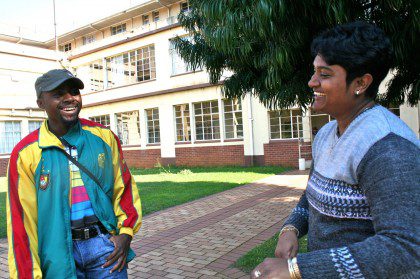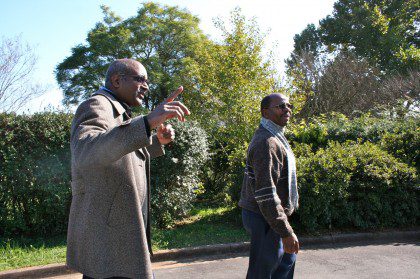
Later this month we will introduce you to the members of the Dehon Formation Community in Chicago. The community is made up of SCJ students and candidates doing their undergraduate and theological studies in preparation for future ministry.
Just as our students in the United States return to school for the fall semester, their counterparts in Africa also get ready for a new term.
The Dehon Formation Community in Pietermartizburg, South Africa, is a pan-African student community with students from Cameroon, Congo, Madagascar, Mozambique and South Africa, as well as India. Directors of the program are Frs. Alessandro Capoferri, SCJ and Zolile Mpambani, SCJ.
Both the students in Chicago and those in Pietermaritzburg do their graduate studies at a theological institute, a graduate school of theology and ministry that prepares a diverse study body for ministry and advanced studies.
Students at the Dehon Formation Community in Chicago attend Catholic Theological Union, the largest Roman Catholic graduate school of theology and ministry in the United States. Thirty-two religious orders are represented at CTU, and they are joined by hundreds of lay students.
Halfway across the world in Pietermaritzburg, SCJ students from the pan-African Dehon Formation Community study at St. Joseph’s Theological Institute in Cedara (near Pietermaritzburg).

St. Joseph’s is a perfect fit for the multi-cultural SCJ community. Its students and faculty represent not only the many faces of the African continent but of Asia, Europe, North and South America. Professors from the U.S. Province, including Fr. Charles Brown, SCJ, and Dr. Richard Lux of Sacred Heart School of Theology, are among many international theologians who have taught at St. Joseph’s.
In 2009, our province publication, SCJ News, did a feature on Dr. Lux’s semester in South Africa. He and his wife Mary lived with the Dehon Formation Community in Pietermaritzburg while Dr. Lux taught at St. Joseph’s.
“My experience at St Joseph’s has been the highlight of my entire teaching career,” said Dr. Lux, reflecting on a career that has spanned 37 years. The Luxes said that they “developed a real attachment to and love for the people, culture and beauty of South Africa. Both of us would return in a minute, and hope to soon.”
However, while Dr. Lux thoroughly enjoyed his teaching experience in South Africa, he found some things to be different than what he was used to in previous teaching assignments. He talked about those differences in the SCJ News article. Unfortunately, his statements inferred that St. Joseph’s is something less than what it is – an internationally well-respected theological institute.
“I have much to learn about cultural differences and clumsy communications,” said Dr. Lux after reading his statements in a different light. “The last thing that I would want to do is hurt St. Joseph’s in any way!”
The U.S. Province apologizes for misrepresenting St. Joseph’s Theological Institute.
“I was rector of our own Sacred Heart School of Theology before being named provincial superior,” said Fr. Tom Cassidy, SCJ. “The last thing that I would want to do is to misrepresent another theological institution serving our Church. I have nothing but the greatest admiration for St. Joseph’s and the work they do in preparing members of the Priests of the Sacred Heart for ministry and for higher education.”
St. Joseph ‘s Theological Institute is an accredited institute of higher learning that is home to more than 200 students and 40 staff members.
St. Joseph’s prepares students for both ordained and non-ordained ministry. It is a part of an ecumenical cluster that includes the School of Religion and Theology of the local university (UKZN) and the Evangelical Seminary. One of the benefits of this collaboration is Cluster Publications “which makes authentic contextual theological works accessible to our students and associates at affordable prices,” states St. Joseph’s on its website.
The institute confreres bachelor’s, master’s and doctoral degrees. It publishes the widely regarded theological publication Grace and Truth and its Denis Hurley Library boasts a collection of more than 37,000 volumes and 108 periodicals.
“Considering the rich reading resources of the various student residences associated with the Institute we have 60,000 books and 150 journals available to our students,” notes St. Joseph’s. “We are also integrated into the data base of the local university and have access to the country-wide interlibrary loan system thereby making most published works and dissertations accessible to our staff and students.”
It is obvious that St. Joseph’s Theolgical Institute is an academic institution with excellent resources and rigorous standards. The fact that one of our publications printed quotes that suggested that St Joseph’s is anything less than a high caliber academic institution was a grave error for which the U.S. Province apologizes.

